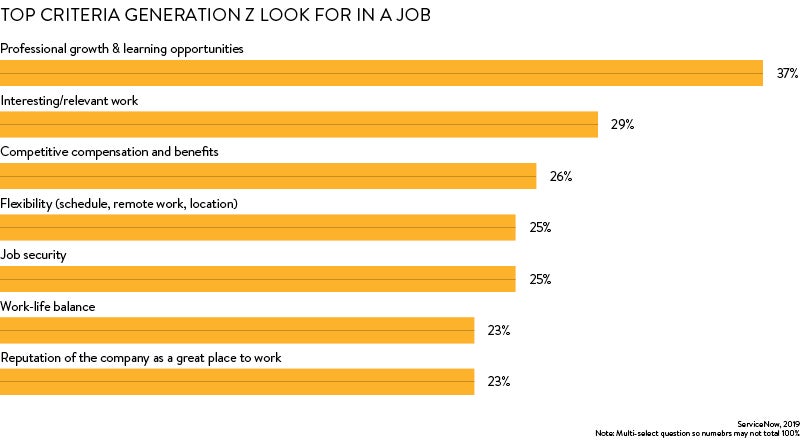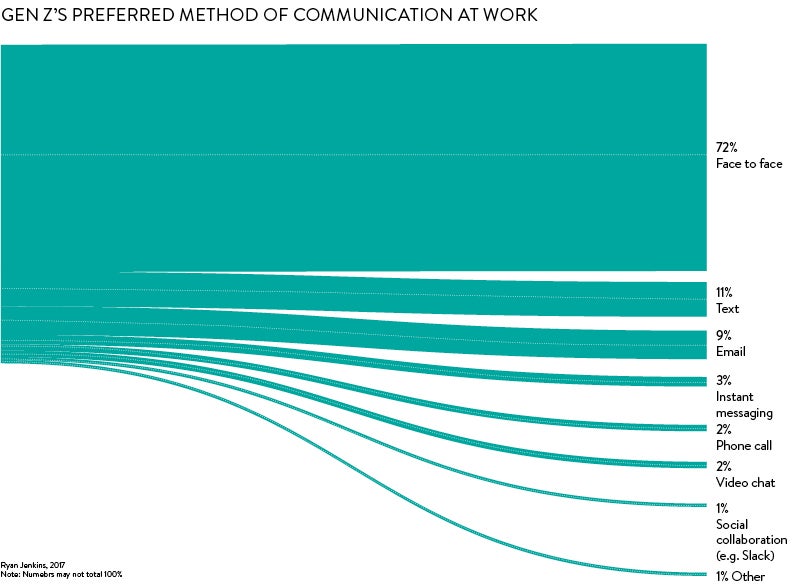The last decade has been the preserve of the Millennial generation, when opportunities for employees ebbed and flowed as economic growth stagnated in the wake of the 2008 financial crash. However, as we move into the 2020s, the lens is now firmly shifting its focus to Generation Z, born after 1997, who are entering the workforce in ever greater numbers and will form 30% of the US labour force alone by 2030.
Shaped by different factors to those who came before them, and having learnt from Millennials’ mistakes, Gen Z employees are distinct for several reasons; they are more self-starting, more self-aware and more realistic. Leaders in the workplace therefore face the challenge of having to adapt and think differently if they are to attract and retain this vital pool of fresh, young talent.
Here are six ways to engage the next generation and create purpose in a Gen Z workforce:
1. Provide growth opportunities for Generation Z skills
The eldest in the Gen Z workforce have grown up watching their parents struggle with the fallout of the 2008 financial crash. Meanwhile their siblings graduated with huge university debt, no promise of careers related to their area of study, not to mention the low chances of being able to find their footing on the property ladder. It is probably no surprise then that research carried out by Indeed.com showed Gen Z are interested in future-proof jobs.
In a climate where the skills to succeed are continually evolving, this means working in jobs which provide opportunities to continue growing and developing the skills which will make them versatile enough to adapt to the changes around them.
When ServiceNow, a cloud computing company in California, conducted a survey of Gen Z employees, it found 37 per cent of respondents cited professional growth and learning opportunities as their main priority when looking for a job. This is probably why tech giants with strong reputations for innovation are so appealing to young talent. On Glassdoor for example, IBM, Google, Amazon and Microsoft are the top four companies receiving Gen Z job applications.

[xyz-ihs snippet=“EY-Top-Criteria-Generation-Z”]
2. Embrace the technology of Generation Z
Gen Z have grown up in a totally digital world and this is apparent in their every behaviour, from social interactions and entertainment, right the way through to education. In the workforce, they expect technology to be up to speed and to play an effective role in digitalising and streamlining processes, which means people-centric digital transformation is key if technology is to live up to its potential. According to research by Dell Technologies, 80 per cent of Gen Z students aspire to work with cutting-edge technology and 91 per cent say technology would influence job choice.
For an ambitious generation keen to secure their place in the future, a workplace’s relationship with technology is one of the best indicators of how forward-thinking a company is.
As artificial intelligence continues to develop rapidly and become a part of our daily lives in tools such as Apple’s Siri or Amazon’s Alexa, workplaces need to think about how they can keep up, not just from an operating perspective, but so they are making the most of the skills young digital natives possess. Gen Z employees are likely to be a driving force in bringing companies into this digital age which means employers will have to find ways to let their naturally tech-savvy new employees help guide their organisation into an ever more tech-reliant world.
For an ambitious generation keen to secure their place in the future, a workplace’s relationship with technology is one of the best indicators of how forward-thinking a company is
3. Build trust by motivating Generation Z
The Gen Z workforce is highly self-motivated and entrepreneurial, with EY research finding 62 per cent would like to start their own company and 89 per cent spend free time pursuing productive activities, rather than just hanging out. To tap into this driven and goal-oriented generation, employers need to show these young employees are truly valued.
With a focus on the future, Gen Z employees are looking for employers who offer career growth, will invest in them and provide the security that has become so scarce in recent years. Part of this means developing trust between these employees and senior leadership.
One of the biggest factors perhaps is closing the generational gap between employees and managers. Some 77% of Gen Z express the preference of having a Millennial manager over Gen X or baby boomers, up from 67 per cent in 2017.
While the eldest Millennials are pushing 40 years old, the younger ones are almost as well versed in the language of tech and social media as those breaking into the workforce in the coming years. As generational divides become even more apparent throughout organisations, having managers who can relate to the unique challenges and experiences of younger employees seems more important than ever.
Other areas to consider include job security, transparency of processes and clear communication. These all massively contribute to creating a culture that feels safe and mutually respectful for a Gen Z workforce.
4. Understand that work-life balance is critical for Generation Z
Burnout has been a huge issue for Millennials with 28 per cent of them claiming to suffer from it regularly in the workplace, representing a 7 per cent increase over older generations. This is a cause for concern for companies as burnt-out employees are far more likely to call in sick or even quit.
Gen Z have learnt a lot from the struggles Millennials have experienced and are more aware of the need for a harmonious work-life balance. The New York Times last year headlined Young People Are Going to Save Us All From Office Life, which lays out the ways in which young people are claiming back balance in their lives in an age of connectivity and mobile technology. This includes asking for more flexible working, remote working and flexitime opportunities, each of which is increasingly becoming less of a perk and more of a norm as the benefits to productivity and motivation become clear.
Getting the right balance requires understanding and listening to Gen Z employees. Surveys and appraisals are a good place to start and can offer both quantitative and qualitative insights into individual, cultural and environmental needs.
Gen Z have learnt a lot from the struggles Millennials have experienced and are more aware of the need for a harmonious work-life balance
5. Keep the human touch with workplace communication
While flexitime and technology are important to a Gen Z workforce, that’s not to say human interactions will no longer be important. In fact, over 70% of Gen Z employees prefer to communicate face to face at work and 60% want more feedback. So, even while jobs become automated and technology becomes more prevalent, real-life communication remains essential.
[xyz-ihs snippet=“EY-Gen-Z-Preferred-Communication-Methods”]
This means that bringing employees together for structured meetings and events should be a priority, while the general culture and environment of the workplace are equally significant.
Office design plays a big part in this, firstly considering how management are positioned in relationship to their teams, but also rethinking things like cafeteria layouts and coffee machine set-ups, which can encourage social interactions and collaboration across departments.

6. Promote diversity and inclusion
Millennials were the first generation to really raise diversity and inclusion (D&I) as being a potential factor in choosing a workplace. For Gen Z employees, it continues to be important with 63% believing it’s valuable to share ideas and learn from people with different backgrounds.
Generational expert Dr Alexis Abramson says the challenge for companies is to convince Gen Z employees they are truly committed to them and D&I. She says: “When recruiting Gen Z, organisations need to be transparent about their D&I policies and programmes, and show a solid, empirical and data-driven approach.”
A developed D&I strategy is key in demonstrating an organisation is thinking about inclusivity and shaping itself for a world that will eventually be given over to young people who are much more progressive, diverse and curious than previous generations.
1. Provide growth opportunities for Generation Z skills

